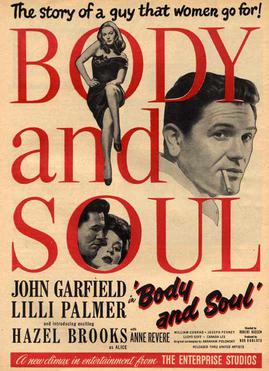Body and Soul is a well-made boxing picture, but it has a historical significance as the nexus of some major careers damaged by the anti-communist hysteria that gripped the United States in the years that followed its release. After its director, Robert Rossen, pleaded the fifth amendment at his hearing before the House Un-American Activities Committee in 1951, he was blacklisted in Hollywood. The same fate befell screenwriter Abraham Polonsky after his refusal to testify before HUAC. The star, John Garfield, testified that he knew nothing about communist activity in Hollywood, but studios refused to hire him; he made his last film in 1951 and died of a heart attack the following year, only 39. Cast members Anne Revere, Lloyd Gough, Canada Lee, and Art Smith were also victims of the blacklist. The film stands as an example of the folly of HUAC witch-hunting: With all the reds and pinkos involved in its production, you might expect it to be pure propaganda, but the only leftist message it communicates is about the danger of greed. Today the only viewers who may find Body and Soul subversively anti-capitalist are those who subscribe to the "greed is good" credo enunciated by Michael Douglas's Gordon Gekko in Wall Street (Oliver Stone, 1987). Garfield plays an ambitious young boxer named Charley* Davis who falls prey to racketeers who manipulate his career, despite the warnings of his mother (Revere), his best friend, Shorty (Joseph Pevney), and his girlfriend, Peg (Lilli Palmer). The fight sequences, shot by James Wong Howe and edited by Francis Lyon and Robert Parrish, were groundbreaking in their realistic violence, winning Oscars for Lyon and Parrish. Howe, who is said to have worn rollerskates and used a hand-held camera to film the fights, was curiously unnominated, but nominations also went to Garfield and Polonsky. Palmer, unable to conceal her German accent or to eliminate traces of the sophisticated roles she usually played, is miscast as Charley's artist girlfriend. The script makes a half-hearted attempt to explain away the accent but mostly ignores it. One thing of note: The black boxer played by Lee calls Garfield's character by his first name, Charley, in their scenes together. The usual racial protocol was for African-American characters to call white ones "Mr." -- "Mr. Charley" or "Mr. Davis" -- the way Dooley Wilson's Sam always refers to Bogart's character as "Mr. Rick" in Casablanca (Michael Curtiz, 1943). It's the earliest example of an assumed equality that I can recall in a Hollywood movie.
*A nitpicky note: The filmmakers never decided whether it was spelled "Charley" or "Charlie." It appears both ways on the posters advertising his fights, but it's "Charlie" in the inscription on a gift he gives Peg and in her letter addressed to him. I'm going with the way IMDb lists it.
A blog formerly known as Bookishness / By Charles Matthews
"Dazzled by so many and such marvelous inventions, the people of Macondo ... became indignant over the living images that the prosperous merchant Bruno Crespi projected in the theater with the lion-head ticket windows, for a character who had died and was buried in one film and for whose misfortune tears had been shed would reappear alive and transformed into an Arab in the next one. The audience, who had paid two cents apiece to share the difficulties of the actors, would not tolerate that outlandish fraud and they broke up the seats. The mayor, at the urging of Bruno Crespi, explained in a proclamation that the cinema was a machine of illusions that did not merit the emotional outbursts of the audience. With that discouraging explanation many ... decided not to return to the movies, considering that they already had too many troubles of their own to weep over the acted-out misfortunes of imaginary beings."--Gabriel García Márquez, One Hundred Years of Solitude
Friday, April 29, 2016
Body and Soul (Robert Rossen, 1947)
Links:
Abraham Polonsky,
Anne Revere,
Art Smith,
Body and Soul,
Canada Lee,
Francis Lyon,
James Wong Howe,
John Garfield,
Joseph Pevney,
Lilli Palmer,
Lloyd Gough,
Robert Parrish,
Robert Rossen
Subscribe to:
Posts (Atom)
